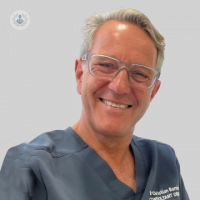Endometriosis: what treatment is right for me?
Escrito por:If you are diagnosed with endometriosis then the question of what treatment to have is different for each person. We spoke to consultant gynaecologist Mr Christian Barnick to find out what treatment options are available for endometriosis, and when each option might be considered.
What is endometriosis?
Endometriosis is a condition where tissue similar to the lining of the womb is found elsewhere in the body. This may cause pain and inflammation. This alone may cause infertility. Where endometriosis is more severe, the Fallopian tubes may be distorted and the ovaries may be stuck and/or cystic. This is more likely to cause symptoms and causes mechanical difficulties in the sperm and the egg getting together, causing additional fertility problems.
Having said this, endometriosis does not always cause symptoms and not all women with symptoms have endometriosis. To make things more complicated, it’s not always clear what the progress of the condition will be – whilst few women diagnosed with endometriosis find that their condition gets better on its own, we do not yet know that it will necessarily get worse.
What are the treatment options?
“Wait and see”
Not everyone opts for treatment, especially if symptoms are mild, there is no imminent risk to fertility, or you are approaching menopause and not concerned about the risk to fertility. You can of course change your mind if in the future if you find your symptoms worsen.
Drug treatment
This can either be through pain relief or hormonal treatment.
Some people with relatively mild symptoms find that they manage their pain well with anti-inflammatory medication such as Ibuprofen combined with Paracetamol. If this is not adequate then patients may be offered Opiate analgesics such as Codeine, Tramadol or Oxycodone. These are safe to take on an occasional basis but if taken regularly may lead to tolerance, escalation and addiction.
Hormonal therapy can be useful in different ways. It may reduce the severity of the endometriosis and reduce inflammation and pain. Used before surgery it may make the surgery easier and it can also possibly delay its recurrence following surgery.
It is important to note that neither of these types of treatment are curative and may have side effects. They may not offer a satisfactory long-term solution to treatment.
Surgery
If your symptoms do not improve or the endometriosis is severe, it is affecting your quality of life or you are thinking of having children and there is a high risk of endometriosis, then surgery should be considered.
Surgery for endometriosis most commonly involves a procedure called laparoscopy. This also diagnostic tool, so some patients are diagnosed and treated for endometriosis in the same session.
Laparoscopy involves inserting a tiny telescope, under general anaesthetic, to allow the surgeon to carefully examine all of the abdominal cavity. The surgeon should aim to excise any endometriosis that is found, wherever possible, using a number of different energy sources such as electrical energy, plasma jet, harmonic scalpel or cold scissors. Personally, I always aim to do this.
Most laparoscopies can be carried out as a day case procedure, but most women in the private sector will elect to stay overnight. It is not clear what the best approach is to treat ovarian endometriotic cysts. This tends to be different from one cyst to another and depends very much on the exact nature of the cyst. What is essential is that the ovary is damaged as little as possible so that future fertility is maximised.
Whatever happens you must be closely involved in your treatment choices. It is our duty to ensure that the patient and their wishes are central to all treatments that are offered.



